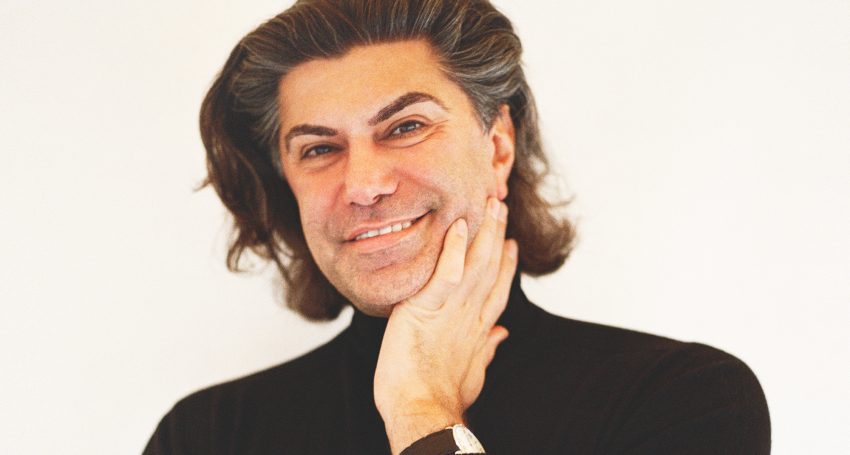Nikolay Tsiskaridze is a leading star of the Russian ballet, whose name is infinitely highlighted alongside stage legends: Galina Ulanova, Maris Liepa, Maya Plisetskaya and Vladimir Vasiliev. The premiere of the Bolshoi Theater has performed on some of the most famous stages in the world from the Paris Opera to La Scala in Milan, and today represents the Vaganova Academy of Russian Ballet in St. Petersburg.
Tsiskaridze is renowned not only as a dancer and teacher, but as a media person too, namely as the host and a participant of TV programmes: “Dancing with the Stars”, “Masterpieces of the World Musical Theater”, “Look”, and now as a formidable character in an exclusive interview with Premiere magazine.
Nikolay, ballet is considered to be a profession that “captivates” a person early and then forever. Had you ever thought differently for a profession, to that of becoming a famous artist on the world’s ballet stages?
If I had not become an artist, I would have become a doctor – an operating doctor who saves lives.
The ballet school is a special world. How did your education in this field impact your life?
Learning as a process was generally, by character, not difficult for me, I was a child prodigy, let’s say a local “landmark”. I focused with dedication, passion and persisted, and, let’s be honest, a child of an early age does not always aspire to this idealism.
Ballet, sports, music, creative arts, can be excessively boring as a routine, maybe the pressure too, to succeed, encounters some individual difficulties. Also, I really didn’t like repeating everything 20-30 times as I got all from the first attempt. But, unfortunately, it had to be done.
Equally, more challenging was the fact that my studies at the ballet school coincided with the collapse of the Soviet Union. It was a very difficult period – there was not a lot of money. We lived, as a community and family, quite modestly, and I went through all the hardships of the “collapse” of the USSR in full. My mother and I became citizens of different countries on the same day, I became a citizen of Russia, and she became a citizen of Georgia. Then we had all sorts of financial problems: constant devaluation of currency, banks periodically undergoing closure, and my mother was already, at that time, a pensioner and very worried about the overall situation.
But as for the school, I repeat: it was easy for me to study, neither my mother nor the teachers were disrespecting to me, and I am, without false modesty, proud to say, one of the outstanding students of the institute upon which I studied both literally and figuratively.
How popular is ballet now in general and by the judging acceptance process of your Academy?
Ballet is probably not as popular today as it was in the middle twentieth century, but many children are brought by their parents. Sadly, nowadays there are not as many talented children as in the 80’s era. Today we see many unwell children, compared to healthy ones – this poses a problem, because we accept only the ones who do not have medical contraindications. And, of course, their abilities, for example Sveta Zakharova had is no longer found in the children of today.
What can you say about the level of today’s ballet in Russia and worldwide?
Classical ballet, unquestionably, will always be superior in Russia: there is no such schooling in any other country, no such drama theater, no such traditions. Any classical ballet is primarily and notably the “Russian Ballet”.
Even what was originally created and staged in France and Italy returned from Russia in a greatly originated form – thanks to the Russian attraction to the dramatic theater. Therefore, all high-profile productions, such as, “Giselle” are already Russian versions – this will, in history, never change.
Now there is a trend: people who have not made a career themselves are at the forefront. Art all over the world is in such a state of incompetence, flattering, rather than talented people, come to the fore. Those who forefront the theaters have made the most of their careers as choreographers and therefore want to promote themselves first of all. Look at any poster, and you will see first all the names of theatrical tops from the administrators, not the artists, as it should be. In Russia, this is a big problem and a tragedy, and therefore we cannot even talk about new names in ballet.
They say that during the Soviet era, Russia was a leader in two areas: rockets and ballet. Are they losing the space race now, but what about ballet?
As for theatrical production we should envy the British or the French: they do it better. As for the artists, it is recognised that these countries do not have such artists and will never have, but in this regard, unfortunately, the bar has now dropped in the same way all over the world.
The saddest thing is that even in such classical performances as Swan Lake, Sleeping Beauty or Giselle, there are not enough talents of a sufficient level. There are just people who move, jump, do some kind of pirouettes. It’s impossible to watch the scene of Giselle’s diversity: “White Adagio” [from “Swan Lake” – ed.] – the prince clings to Odette, she rubs against the prince…
In general, chastity and poetry have completely disappeared from ballet, some kind of stupidity and absolute vulgarity (my opinion) now dominate the stage. This is a general tendency, and this was brought about by mediocrity and faceless leaders who themselves have never been artists of the first rank, but thanks to some flattering qualities have made their way to the helm and now ruining the foundation of “ballet” all over the world.
What advice would you give to parents who want to turn their children into ballet stars? What is the best age to bring a child to ballet? What is the reason for this? What would you advise to get children interested in dancing initially and motivate them in the future?
Children should be brought to ballet from the age of ten – before that it is useless, but it is impossible to argue with their parents. Mothers imagine their three-year-olds in packs, in fouettes, and so on, and no matter how much I explain that this is not allowed, it is harmful, that it is not necessary to do so – it is unrealistic to explain. Everyone wants to immediately put the child on his fingers, and so that he immediately begins to perform complex steps.
I think this is wrong and I never watch shows like this. Apart from mediocrity, they show nothing and cause nothing except irritation.
The skeleton of the child should be formed; 10 years is the most harmonious time to start practicing ballet, and you need to master everything very thoughtfully and evenly. And we must not forget that everything will change during puberty. A cute little child can turn into a crocodile, and vice versa, an unsightly child suddenly blooms into a beautiful swan, nature will take its toll, heredity will defeat any naive hopes.
As for “how to interest” … I don’t even know: if the child wants, he will dance himself. But in any case, bring him to the theater on time, correctly show this genre, explain what the beauty of ballet is – it all depends on the parents. Personally, I am very happy that my parents at one time took it very thoughtfully and seriously.
You started an Instagram account last year. Was it dictated by the fact that a media person needs to be constantly in trend and in sight, or did it just fascinate you as a process? How do you feel about social media in general?
I started Instagram during lockdown, literally for one time – the whole world then went online, and I had to give an interview, and I promised my colleague Yusif Aivazov that I would go online. And then the students persuaded me to keep the account, because during the short time that I was giving interviews, several thousand people subscribed to me. It was so funny because I didn’t expect it at all.
I have a very negative attitude to all social networks, although I have been using Instagram lately and thanks to it, I learn a lot of news from the world of ballet, I keep track of how my students and graduates’ dance. Unfortunately, I’m mostly upset because they don’t dance very well – but this is due to the crisis of modern theater.
Although the guys do not think so, they are promoting themselves, praising, congratulating each other.
Sometimes, looking at someone’s performances on Instagram, I just think: Lord, are they really not ashamed to expose this. If I saw myself in this form – and I recorded each of my performances – I would never go on stage again. And sometimes I see some interesting people and observe what is happening in the world – it has become very convenient.
In your interviews, you often talk about betrayal and meanness. Are you capable of forgiving betrayal? Has life put you before such a choice?
There is a lot of meanness and betrayal in the world, and it all surrounds us. For example, Instagram – it amazes me how many bastards and dummies are beginning to talk about faith, about some kind of moral goals. This in general makes me dumbfounded, I will not give any assessment to this – I’m just surprised how widespread it has become, and the more stupid a person is, the more he declares himself.
As for betrayal – I’m not going to forgive anyone, God forgives, but I try to move away from such people and never communicate with them again.
Of course, life presented me with a choice. One of such brightest moments was in 1995 – the famous strike for Grigorovich at the Bolshoi Theater, and then everyone on the list forced to sign that they allegedly did not participate in this. At that time, I was the only one who did not sign, although they scared me very harshly. So personally, I sleep well and I don’t want and will not communicate with people capable of meanness.
What can you never come to terms with? With what people will you never sit at the same table and shake hands?
I cannot tell you that I cannot be reconciled to something – I am still a Christian, I must accept and understand everything. But with people who have committed some vile deeds towards me, I, of course, will not communicate and eat. Sometimes, however, we still have to, because we can intersect at someone’s funeral or anniversary. This is not my event, and I will never allow myself to be disrespectful. Well, so – I’m a normal person, just like everyone else, and I don’t want to deal with scum.
What is the most precious thing in your life to you?
Life itself. Life is beautiful, and I am grateful to her for all my victories, for many beautiful and wonderful things, as well as for the failures that fell on my way and taught me a lot.
What is love for you?
Love is a feeling that disappears very quickly: it cannot exist without respect. It is very difficult to earn respect, but love, as they say, comes and goes, but you always want to eat. So, from my point of view, this is the most useless feeling.
On the other hand, as an artist who constantly played performances with some kind of lofty feelings, with dramas, with tragedies, there was so much of this on the stage that in my life it became generally uninteresting to me. However, I, of course, love this state of falling in love – but it is very difficult to find it, it always happens spontaneously, and not like a taxi that arrives on call.



